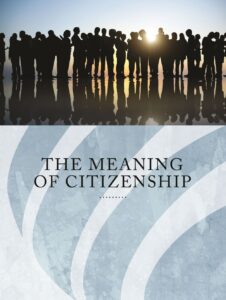Back to: Civic Education JSS1
Welcome to class!
In today’s class, we shall be talking about the meaning of citizenship. Please enjoy the class!
Meaning of Citizenship

Citizenship is a multifaceted concept that extends beyond legal definitions, encompassing rights, responsibilities, and active participation in the community. In this class, we will explore the meaning of citizenship, examining its various dimensions and the role it plays in fostering a sense of belonging, civic engagement, and societal cohesion.
What is Citizenship
Citizenship is often defined legally, indicating an individual’s membership in a particular nation with associated rights and duties.
It involves active participation in civic life, including community activities, public discourse, and contributing to the well-being of society.
Citizenship goes beyond legalities and actions; it involves a deep sense of belonging to a community, fostering connections with fellow citizens.
Dimensions of Citizenship
Rights and Privileges
Citizenship grants individuals certain rights and privileges, such as the right to vote, access education, and enjoy legal protection.
Responsibilities
Alongside rights, citizenship entails responsibilities, including adherence to laws, civic duties, and contributing to the betterment of the community.
Cultural Identity
Citizenship often intertwines with cultural identity, reflecting shared values, traditions, and a sense of national or community pride.
Significance in Civic Life
Democratic Participation
Citizenship is crucial for democratic societies, as active participation in elections and decision-making processes ensures the representation of diverse voices.
Community Building
Actively engaged citizens contribute to community building, fostering social cohesion and a supportive environment for all members.
The meaning of citizenship extends beyond legal boundaries, embodying active participation, a sense of belonging, and shared responsibilities. As individuals embrace their roles as citizens, they contribute to the vibrancy and resilience of communities, ensuring that the principles of democracy, inclusivity, and cultural identity are upheld. Evolving notions of citizenship reflect the dynamic nature of societies and the need for inclusive frameworks that embrace diversity and interconnectedness.
We have come to the end of today’s class. I hope you enjoyed the class!
In the next class, we shall be discussing Types of Citizenship.
In case you require further assistance or have any questions, feel free to ask in the comment section below, and trust us to respond as soon as possible. Cheers!
Question Time:
- How does the legal perspective of citizenship intersect with the broader concepts of civic engagement and a sense of belonging within a community?
- Can you share examples of how individuals actively participating in civic life contribute to the well-being and cohesion of their communities, beyond fulfilling legal obligations?
- In what ways does citizenship encompass both rights and responsibilities, and how can a balance between these dimensions strengthen the fabric of a society?
